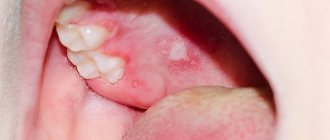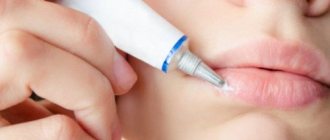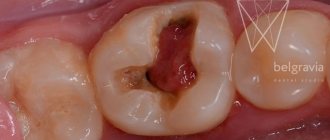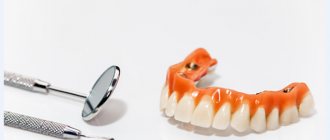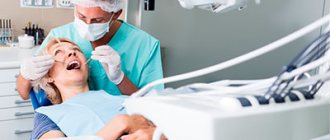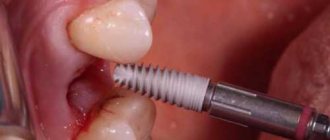Ointments for treatment
Flucinar An integrated approach is used to treat the edematous form of herpes.
Treatment is prescribed after diagnostic studies. Treat the inflamed area with gel or ointment. For example ''Acyclovir'' or its analogue ''Zovirax''. More effective ointment ''Flucinar''. Antiviral drugs, immunity boosters, and others are also used. They reduce swelling, quickly heal ulcers, reduce itching, and help wounds heal quickly. It is better to apply the ointment with cotton swabs so that the herpes does not transfer to another area of the skin. Continue treatment for a week. Along with the medications described above, it is good to take vitamins C, group B. Vitamin E accelerates healing and reduces pain. Zinc with vitamin C reduces the duration of the disease. Damaged cells are restored using the herbs ginseng, echinacea, as well as pantocrine and mumiyo, which have a good effect.
What is herpes?
Almost 90% of people are infected with the herpes virus. However, the disease manifests itself in only 17%. There are about 100 types of herpes, 8 of which can parasitize the human body.
When a person is healthy, his immune system copes with the virus, but as soon as he catches a little cold, herpes begins to attack the body. Sometimes signs of virus activation appear near the eyes, on the eyelids. How dangerous is this? Many people have encountered this disease. Some people don't even make any attempt to get rid of the signs of herpes. They often go away on their own as soon as a person recovers from a cold. However, herpes on the eye is a very dangerous disease, since if left untreated, the virus causes severe side effects and causes the development of serious ophthalmological diseases.
It is impossible to completely cure herpes. If it enters the body, which happens through airborne droplets, through contact with household objects, through food, it is no longer possible to get rid of it. The virus will remain dormant in the nerve ganglia until the person becomes ill and his immunity weakens. In this regard, therapy does not eliminate the virus itself, but its symptoms. So, why does herpes occur on the eye, how is it treated and can its occurrence be prevented? Let's take a closer look at these questions.
Symptoms of different types of herpes
A “sleeping” virus may not bother its host for years. But if for some reason the virus enters the active phase, it is easy to recognize - by its characteristic rashes. The “classic” visual sign of herpes is itchy, watery blisters that can appear in different places - on the face and on the body.
There are several types of herpes virus - they differ in their manifestations. Most often in medical practice, diagnoses such as HSV-1 and HSV-2 are encountered - this is the abbreviated name for herpes simplex viruses types 1 and 2.
Cold sores and chicken pox are related diseases caused by herpes. Several types of the virus can “coexist” in one person.
| Many people call this pathology a “cold on the lips,” although the “classic” cold and herpes are different things. We are talking about the herpes simplex virus type 1, which usually “attacks” the lips and nasolabial triangle. Externally, the disease manifests itself in the form of rashes. They represent one or a whole cluster of bubbles with liquid contents. When asked whether there can be a fever with herpes, the answer is positive: many patients complain of fever, headaches and general weakness. Among doctors, there is another name for pathology: when you see a diagnosis such as oral or labial herpes in your medical record, know that we are talking about the herpes simplex virus type 1. Herpes on the lip is usually very itchy |
| The second type of herpes simplex is accompanied by the development of genital (genital) infections. The disease in most cases is asymptomatic or, as with labial herpes, is accompanied by the appearance of blisters (ulcers), but only in the area of the external genitalia. Other signs of HSV-2 are fever, body aches, fatigue, and swollen lymph nodes in the genitals. Most often, the disease is transmitted sexually, but infection can also occur from a person with labial herpes. |
| Virus type 3, also known as the herpes zoster virus, is the culprit of chickenpox. To become infected, it is enough to enter into a conversation with a sick person (transmission occurs through airborne droplets). Having had chickenpox, a person remains a carrier of this virus for the rest of his life. In case of relapse, there is a risk of developing herpes zoster. This disease is characterized by the appearance of itchy rashes throughout the body, as well as fever. Chicken pox |
| Herpes type 4 causes such a serious infectious disease as mononucleosis. This disease is accompanied by enlarged lymph nodes and fever; the patient complains of a sore throat and general weakness. The liver and spleen are also affected. |
| Herpes type 5 provokes the development of cytomegalovirus. The disease manifests itself differently, depending on which organ is affected. A runny nose, disturbances in the gastrointestinal tract, inflammatory diseases of the genital organs - all this can be a sign of pathology. |
| In addition to those described above, there are also types 6, 7 and 8 herpes. Scientists are now studying these viruses. |
How to relieve swelling with herpes?
There are 8 forms of herpes infection. Of these, edema is most often provoked by the activity of the first type of pathogen. During the course of the disease, various clinical phenomena are possible, among which the most common are:
- itching;
- burning;
- pain.
Thus, the first type of disease manifests itself shortly before the formation of vesicles with serous contents.
Knowing the causes of pathology, you can take measures in advance to prevent exacerbation of the disease. The appearance of herpes is promoted by various factors that weaken the immune system:
- kidney diseases;
- avitaminosis;
- hypothermia;
- respiratory and other pathologies;
- mechanical damage to tissues and so on.
Under the influence of these factors, the herpes simplex virus is activated, which is why the patient may feel an unpleasant burning and tingling sensation in a place where watery formations may subsequently appear. As they form, the size of the bubbles gradually increases, which increases the swelling of the affected area, which is explained by the rapid development of the inflammatory process.
During this period, it is necessary to use a medicine whose action is directed directly against the virus. Otherwise, the inflammatory process will spread to healthy tissue, causing the affected area to increase.
Less commonly, when this disease recurs, no blistering rashes occur. The only sign of exacerbation is swelling.
Manifestations of infection can be controlled with antiviral medications and other medications
It is important that in the treatment of herpes, a complex of drugs is used that not only eliminates the symptoms, but also strengthens the immune system. It is optimal if treatment is started at the initial stage of the disease (when a burning sensation appears)
Herpes virus type 8
Herpes virus type 8 can cause Kaposi's sarcoma and Castleman's disease. Kaposi's sarcoma is a serious pathology that is accompanied by the appearance of malignant skin tumors. It is quite difficult, especially with immune deficiency. May be complicated by inflammation of the mucous membrane of the palate and lymph nodes.
Castleman's disease is a rare disease in which fever, enlargement of the liver and spleen, anemia, and a sharp decrease in body weight are observed.
Oral medications
Herpes is a viral infection. You can get rid of its symptoms with the help of medications taken orally. Oral medications block the activation of viral cells, due to which the external manifestations of herpes go away.
Most often, dermatologists prescribe drugs based on acyclovir - these are tablets of the same name, Zovirax, Ciclovir and others. The course of treatment depends on the course of the disease, usually it does not exceed 7 days. Symptoms such as swelling, burning and itching disappear after 1-2 days.
Immunomodulators are rarely prescribed as primary treatment and are usually combined with antiviral medications.
- Cycloferon, the full course of treatment lasts a month.
- Amiksin, course duration varies from 10 days to a month.
- Likopid, the course of treatment lasts 6-10 days, after which a break is taken for 3 days.
Immunomodulators relieve swelling by activating natural protective functions. The body begins to fight herpes on its own and after a few days the unpleasant symptoms of the disease begin to subside.
Before you start dealing with swelling, you should consult a dermatologist or therapist. The doctor will confirm the diagnosis and prescribe an effective treatment regimen.
Author of the article
Dermatologist, doctor of the highest category, 31 years of experience.
What to do for warning?
The best preventative measures to prevent this disease and its manifestations will be regular measures to strengthen the immune system. These include:
- Hardening. Dousing with ice water, Russian bath and sauna with herbal teas, walking barefoot on the grass in the summer, contrast shower.
- Autohemotherapy. A method in which blood is taken from a vein and injected into the buttock according to a special scheme. First, increase the dose and then gradually decrease it.
- The use of well-known strengthening folk remedies: ginseng, echinacea, licorice root, rose hips, herbal teas.
Causes
Thanks to the tear fluid - it contains secretory immunoglobulins that reliably protect our eyes from various infections. Her strength, unfortunately, is not enough if the immune defense of the body as a whole weakens.
This happens for various reasons: after infectious diseases, surgery, stress, hypothermia.
In such circumstances, ophthalmoherpes quickly finds the “weak link” and manifests itself in all its “glory.”
The immediate impetus for the start of his hostilities is:
- eye injuries;
- contact with a sick person;
- using the same hygiene products with the patient;
- use of immunosuppressants.
An outbreak of the disease can occur in a pregnant woman, since during pregnancy the body undergoes dramatic changes and the immune system weakens.
Experts distinguish two methods of infection: endogenous (viral herpes, having entered the body, under favorable circumstances, manifests itself in various areas, including the cornea of the eye or the eyeball) and exogenous (the infection enters the mucous membrane of the eye from the outside).
The second option is more common in children than in adults, because children constantly violate the rules of hygiene, participate in general games and can easily catch some kind of infection.
According to medical statistics, 80 percent of infections in young patients occur through exogenous infection.
What to do for warning
The best preventative measures to prevent this disease and its manifestations will be regular measures to strengthen the immune system. These include:
- Hardening. Dousing with ice water, Russian bath and sauna with herbal teas, walking barefoot on the grass in the summer, contrast shower.
- Autohemotherapy. A method in which blood is taken from a vein and injected into the buttock according to a special scheme. First, increase the dose and then gradually decrease it.
- The use of well-known strengthening folk remedies: ginseng, echinacea, licorice root, rose hips, herbal teas.
If the lip is swollen, folk recipes or medications should be used in combination and regularly, then a quick and lasting effect is achieved. Thus, treating swelling with herpes will not be a problem at the very beginning of the disease and will help speed up healing. The main thing is to monitor your health and then herpes will not cause inconvenience.
When a tumor has formed on the lip, one can only assume that this is a consequence of herpes if the body is characterized by this disease. At the initial stage, before the bubbles appear, the lip is very swollen and painful.
Within a day, a bubble forms at the site of the swelling, containing a clear liquid inside. The bubble that appears cannot be broken or pressed. This should not be done because there is an infectious agent in the bladder.
Contact with healthy areas of the lip or skin nearby can lead to swelling of this area. It is best to use remedies at the swelling stage that will remove the swelling and avoid further development of the disease.
Very often lip swelling occurs:
- from hypothermia;
- weakened immune system;
- overwork;
- stress;
- headache;
- insomnia.
Swelling is characterized by sharp swelling of the tissues, which collides with fatty tissue on the skin. If herpes often appears in the same area of the lip, a lump may form on the skin.
External medications
You can get rid of swelling using acyclovir-based creams and ointments.
This substance not only removes swelling, but also has other properties:
- relieves itching and burning, these symptoms are characteristic of any stage of herpes;
- triggers regeneration processes in skin cells, promotes rapid healing of the source of infection;
- has an antiviral effect, blocks the activity of herpes.
The most famous drug based on this substance has the same name - Acyclovir. The product is available in the form of ointment and cream, they differ in their base. The ointment has a greasy texture due to lanolin in its composition.
Using the drug you can relieve swelling in a short period of time. If you use the product according to the instructions, apply it to the affected areas of the skin 4-5 times a day, then the swelling may disappear the very next morning.
Zovirax is a drug in ointment or cream format that contains acyclovir. To achieve the fastest effect, apply the product throughout the day with an interval of 3-4 hours. Complete relief from herpes occurs within 6-7 days of regular use of Zovirax, and swelling disappears after 24 hours.
If you notice the very first symptoms of herpes, then Panavir-gel can help avoid swelling altogether. The drug is based on organic raw materials extracted from potato shoots. Apply the gel to the affected areas in a thin layer up to 5 times a day. The main advantage of Panavir is the lack of addiction to the components of its composition.
Bepanten wound healing ointment is used as an additional remedy aimed at relieving the symptoms of herpetic infection. You need to apply the product 1-2 times a day in a thin layer, the swelling goes away after 1-2 days. The drug is approved for use by pregnant and lactating women.
Possible complications
Without timely and adequate treatment, herpes infection can cause severe complications:
- disruption of internal organs;
- eye diseases;
- deafness;
- sore throat;
- nervous and mental disorders;
- infertility.
Sources:
- A.G. Side. Herpesvirus infections in children - an urgent problem of modern clinical practice // Children's infections, 2010, No. 2, pp. 3-7.
- Taieb, N. Diris, F. Boralevu, C. Labreze. Herpes simplex in children. Clinical manifestations, diagnostic value of clinical signs, clinical course // Ann Dermatol Venerol, 2002, v.129, No. 4, p.603-608.
- M.N. Kankasova, O.G. Mokhova, O.S. Pozdeeva. Frequently ill children: the view of an infectious disease specialist // Practical Medicine, 2014, No. 9(85), pp. 67-71.
- I.F. Barinsky, L.M. Alimbarova, A.A. Lazarenko, F.R. Makhmudov, O.V. Sergeev. Vaccines as a means of specific immunocorrection for herpes infections // Questions of Virology, 2014, pp. 5-11.
The information in this article is provided for reference purposes and does not replace advice from a qualified professional. Don't self-medicate! At the first signs of illness, you should consult a doctor.
Complex therapy, pain relief
A patient suffering from a neuralgic disorder must be treated with painkillers. Doctors do not recommend enduring pain steadfastly - this can provoke an increased reaction and the development of a chronic syndrome.
Painkillers should be taken until the discomfort disappears. To relieve the syndrome, the following groups of drugs are prescribed:
- NPS – “Ketorolac”, the drug “Aspirin”, the drug “Ketorolac”, “Ibuprofen”.
- Antidepressants (tricyclic) - Clomipramine, medication Imizin.
- Anticonvulsant medications - Pregabalin or Gabapentin.
- Blockades using novocaine, electrical stimulation of injured nerves.
- Potent analgesics that can reduce the intensity of the syndrome are Tramadol.
- Local medications that contain capsaicin - “Mataren Plus” ointment.
NPS are used at the height of the disease. To alleviate the painful syndrome, a neurologist may prescribe:
- "Nimesulide", simple "Aspirin";
- "Ibuprofen" or "Desketoprofen";
- "Ketoprofen".
NPS allow you to numb the problem area and relieve inflammation during the period when neuralgia begins to progress. The drugs are taken orally in the form of a suspension, capsules or syrup. To relieve herpetic syndrome, topical agents with hot pepper extract are prescribed along with medications of this group. Lidocaine-based gel provides effective pain relief.
After recovery, postherpetic neuralgia is treated with novocaine blockades, drugs of the NPS group, using other methods at the discretion of the doctor and taking into account the individual characteristics of the body.
Swelling due to herpes
Causes
The main reasons that provoke an exacerbation of the disease are:
- contact with a person with an active phase of the disease;
- significant hypothermia;
- severe stress;
- lack of vitamins and nutrients in the body;
- overwork and heavy loads;
- colds or other viral, bacterial diseases.
Symptoms and manifestations
Different forms of the virus have different types of external symptoms, but the most common are:
- with manifestations on the genitals;
- with manifestations on the skin of the face, mucous membranes and swelling on the lip.
The bubbles merge with each other, affecting more and more tissue.
Associated symptoms are itching, tingling, burning and pain. Redness and swelling are observed in the affected area of the skin. When the lip is severely swollen, painful blisters soon appear. Such elements filled with liquid can be single or multiple, prone to fusion. They merge, and the tissue around them swells even more. As they develop, the blisters burst and change into ulcers or erosions. Lips with herpes become covered with a hard, dark crust that can crack and bleed.
What to do for warning?
The best preventative measures to prevent this disease and its manifestations will be regular measures to strengthen the immune system. These include:
- Hardening. Dousing with ice water, Russian bath and sauna with herbal teas, walking barefoot on the grass in the summer, contrast shower.
- Autohemotherapy. A method in which blood is taken from a vein and injected into the buttock according to a special scheme. First, increase the dose and then gradually decrease it.
- The use of well-known strengthening folk remedies: ginseng, echinacea, licorice root, rose hips, herbal teas.
Acyclovir-based drugs
Acyclovir and derivatives of this drug (Zovirax, Virolex and others) are used in the treatment of all forms of herpes, including herpes zoster. The medicine affects only the virus, introducing itself into the DNA structure of the pathogen and preventing the spread of infection to healthy tissue. A drug with this effect is available in the form of tablets and ointments.
It is recommended to use Acyclovir when the pathology manifests itself in the form of itching and burning. Due to the fact that the drug suppresses the activity of the virus, the swelling quickly subsides.
"Acyclovir" in tablet form is used in severe cases when the disease becomes generalized. In case of local damage, ointments based on this substance are prescribed. Patients with immunodeficiency should consult a doctor before use. Frequent treatment of affected areas of the face reduces the effectiveness of Acyclovir.
Principles of treatment
Herpes can and should be treated. Currently, medicine has a whole arsenal of drugs that, in most cases, make it possible to obtain a lasting clinical effect in those who suffer from recurrent herpes and to successfully control periods of activation of the disease in asymptomatic forms. It is impossible to achieve complete removal of the virus from the body using currently existing treatment methods; it is possible to maintain the body in a state where the virus does not have a chance to activate. Currently, there are two main directions of treatment for herpes simplex:
- The use of antiviral drugs, the main place among which is occupied by acyclovir-containing (ACV) drugs. In case of exacerbation of herpes, the first aid remedy is medications containing acyclovir: ZOVIRAX, VAPTREX, ACICLOVIR-ACRI, VIROLEX. They are available in the form of tablets and creams. The same drugs are used locally in the form of cream and ointment. Taking these medications should begin in the first hours of an exacerbation.
- A complex treatment method that includes immunotherapy in combination with antiviral therapy. As a rule, the disease occurs against the background of suppressed immune reactions, so immunotherapy plays an important role in the treatment of herpes. If relapses of the disease are seasonal (autumn, spring) and they are accompanied by symptoms of ARVI, then to antiviral treatment with drugs containing acyclovir, it is advisable to add a course of drugs that stimulate the synthesis of interferon (a substance produced by the body and providing an antiviral effect): herbal immunostimulants (for example, IMMUNAL) and synthetic drugs such as ARBIDOL, AMEXIN, VIFERON, KIPFERON. Moreover, they can be used for preventive purposes about a month before the onset of autumn slush and spring hypovitaminosis). If relapses of herpes (at any location) occur more than 3-4 times a YEAR, this is a reason to consult a doctor. This means that the body's defenses (immunity) cannot cope with the infection. In such cases, after studying the immune status, the patient is prescribed complex treatment, including antiviral and immune drugs. In patients with recurrent herpes, the drugs TACTIVIN, TIMALIN, THIMOGEN, MYELOPID, etc. are successfully used (treatment must be carried out after an immunological study).
What to do for warning?
The best preventative measures to prevent this disease and its manifestations will be regular measures to strengthen the immune system. These include:
- Hardening. Dousing with ice water, Russian bath and sauna with herbal teas, walking barefoot on the grass in the summer, contrast shower.
- Autohemotherapy. A method in which blood is taken from a vein and injected into the buttock according to a special scheme. First, increase the dose and then gradually decrease it.
- The use of well-known strengthening folk remedies: ginseng, echinacea, licorice root, rose hips, herbal teas.
How to treat swelling?
When a person develops herpes, there are different ways to remove swelling from the lip. The use of ointments and creams based on acyclovir can help stop the process of relapse of the disease, bring you closer to a speedy recovery and get rid of lip swelling.
The composition contains zinc, l-lysine, hydroxytolene. These medications can quickly heal ulcers and blisters and reduce itching.
These drugs contain components that destroy the manifestations of herpes, relieve pain and heal. Use at least 5 times a day for a week. The ointment should be applied regularly until the blisters disappear completely and then used for another 2 days.
Your doctor may prescribe the drug valacyclovir, in tablet form. If you take 2 tablets of valacyclovir in the morning and evening, you will notice that the affected area heals quickly, and the symptoms of a cold and lip swelling are blocked.
If the affected area is small and does not cause severe pain, you can use antiviral ointments such as Herpevir, Zovirax. They will help the wounds heal quickly.
At the first symptoms of herpes, you should change your diet. It is not recommended to eat fatty and salty foods, drink beer, chocolate, peanuts, as these products favor the development of herpes infection. Also, you should not kiss during the period of illness, avoid kissing children. In childhood, the body is more susceptible to infection.
When the occurrence of herpes occurs very often, you should visit a doctor. This course of the disease may be due to problems in the lymphatic system.
Traditional methods
It is very rare to meet a patient with the disease herpes on the lip at a doctor’s appointment. Often people resort to self-medication, relying on traditional methods.
A universal folk remedy is garlic. It helps eliminate swelling and relieves symptoms. It is best to use it at the initial stage of development, when you feel a tingling, burning sensation on your lips.
Therefore, lubricate the swelling with garlic juice. Onions are also excellent for removing swelling; pieces of it are applied to the affected area.
Aloe juice is an excellent antibiotic. As soon as the first signs of the disease appear, you need to squeeze the juice out of the leaf. Take 1 teaspoon daily 2-3 times a day.
If the lip is very swollen, a piece of ice wrapped in a scarf can help and alleviate the patient’s condition. It must be applied to the inflamed area. By doing this procedure, the swelling will go away and the itching will decrease. In this case, taking medications is mandatory. If herpes appears on the lip, you should immediately replace your toothbrush, also after the disease has passed.
Using Kalanchoe juice will dry out the formation on the lip, and the wound will heal quickly. The plant contains substances that can suppress the virus in a short time.
You can do a procedure to get rid of colds using black tea. You should brew the tea, then lower the spoon into the hot tea leaves and hold it there for 2 seconds. Apply to the affected area. To get rid of the sore, perform manipulations at least 5 times a day.
Fir oil will also help remove the infection. The oil has an analgesic and restorative effect in the fight against wounds. Apply to the affected area every 2 hours throughout the day.
You can get rid of the disease with the help of soda. You need to prepare a mushy paste by adding a little water. Apply the paste every 20-30 minutes without interruption. After 6 hours, the result will be noticeable, the herpes will begin to go away. Apply the paste for at least 2 days.
The occurrence of an infection on the lip signals a strengthening of the immune system. Having appeared once, the virus remains in the body forever and with each weakening of the immune system it constantly manifests itself.
Types of herpes virus infections
More than 100 representatives of the herpetic family of viruses are known. However, most often a person is affected by 8 of them. Let us consider in detail the features and symptoms of the most common infections.
Herpes simplex virus types 1 and 2
The herpes virus type 1 causes blistering rashes on the mucous membranes of the lips and nose. As a rule, infection occurs in childhood. By the age of 5-7 years, more than 50% of children are carriers of the infection. Infection often occurs from sick parents: through kisses, household items.
The incubation period lasts from 2 days to 2 weeks. In addition to the characteristic rashes, the infection may be accompanied by elevated body temperature and enlarged local lymph nodes. After damaging the mucous membranes, the virus reaches the trigeminal nerve, where it can remain latent for a long time.
Herpes simplex virus type 2, or genital herpes, is primarily transmitted through sexual contact. In Russia, the average is 20% among the adult population. In European countries, the incidence rate is even higher. The risk group includes people who have promiscuous sex. Most infections occur during puberty, at the beginning of active sexual life.
Symptoms of the virus include:
- blistering rashes on the genitals;
- enlargement of regional lymph nodes;
- painful urination;
- itching in the groin area;
- elevated body temperature.
The disease can occur with frequent relapses (6-12 times a year or more).
Herpes virus type 3
This virus can cause two diseases: chickenpox and herpes zoster. As a rule, chickenpox occurs in childhood and is accompanied by characteristic symptoms:
- vesicular rash that lasts about 10 days;
- high body temperature, fever;
- headache;
- itching of the skin;
- symptoms of body intoxication.
Chickenpox in adults occurs rarely and can occur in a more severe form: with damage to the eyes and nervous system. In such a situation, a person requires urgent hospitalization. After the disease, the virus remains in the body for life, remaining latent in the nerve ganglia.
Vaccination is the most effective way to prevent the disease in children and adults who did not have chickenpox in childhood and were not vaccinated against it. Vaccination is given to children from one year of age. The immunobiological drug is administered twice with an interval of 6 weeks. Vaccination is also carried out as an emergency measure in the first three days after a person comes into contact with a patient with chickenpox.
Typically, herpes zoster occurs in people over 65 years of age. The disease is severe and is accompanied by severe symptoms:
- severe pain;
- sleep disturbance;
- high temperature;
- vesicular rashes that appear along the nerve endings.
The disease has a rather difficult rehabilitation period. Even after the rash disappears, a person may remain sore for a long time in those areas that were affected by the infection. In all civilized countries of the world, elderly people are vaccinated to prevent herpes zoster.
Epstein–Barr virus
Herpes virus type 4 or Epstein-Barr virus affects the human body in a complex manner, provoking various and sometimes unrelated pathologies. The virus can cause infectious mononucleosis, lymphoma, hepatitis, affect the nervous and immune systems, and the hematopoietic apparatus.
In the human population, infection with the Epstein-Barr virus reaches 75% or higher. Children over two years of age and adults under 30 years of age are at risk. Children under one year of age rarely get sick due to passive immunity received from the mother.
The symptoms of the disease are many-sided and can have various manifestations: from mild discomfort to severe health problems. The most common symptoms of the disease are:
- high temperature, fever;
- sore throat, muscles;
- enlarged lymph nodes, liver, spleen;
- the appearance of rashes, peeling, inflammation, bruising on the skin;
- photophobia;
- nausea.
It is characteristic that the use of antibiotics does not affect the duration of fever.
Herpes virus type 5
Cytomegalovirus infection, caused by herpes virus type 5, occurs in both children and adults. It can occur as a mononucleosis, with high fever, intoxication, purulent sore throat, and damage to the salivary glands. In addition, the infection may be asymptomatic.
There are also congenital forms of the disease, which often lead to the development of hearing loss, microcephaly in the child, cause enlargement of the liver and spleen, and hematological disorders.
Herpes viruses type 6 and 7
The range of diseases caused by these viruses is diverse. Often infections occur in the form of a sudden exanthema. Hepatitis virus type 6 can provoke chronic fatigue syndrome and infectious mononucleosis. It is believed that a consequence of viruses can be a lymphoproliferative process (the formation of tumors of the lymphatic system).
As a rule, sudden exanthema affects children under two years of age. The disease occurs with high fever and intoxication of the body. Febrile convulsions may occur and a rash appears, which goes away on its own after a few days.
Chronic fatigue syndrome (CFS) is accompanied by rapid fatigue and decreased performance. Patients are concerned about low-grade fever, enlarged lymph nodes, and the appearance of catarrhal manifestations in the pharynx.
How to treat swelling?
When a person develops herpes, there are different ways to remove swelling from the lip. The use of ointments and creams based on acyclovir can help stop the process of relapse of the disease, bring you closer to a speedy recovery and get rid of lip swelling.
The composition contains zinc, l-lysine, hydroxytolene. These medications can quickly heal ulcers and blisters and reduce itching.
These drugs contain components that destroy the manifestations of herpes, relieve pain and heal. Use at least 5 times a day for a week. The ointment should be applied regularly until the blisters disappear completely and then used for another 2 days.
Your doctor may prescribe the drug valacyclovir, in tablet form. If you take 2 tablets of valacyclovir in the morning and evening, you will notice that the affected area heals quickly, and the symptoms of a cold and lip swelling are blocked.
If the affected area is small and does not cause severe pain, you can use antiviral ointments such as Herpevir, Zovirax. They will help the wounds heal quickly.
At the first symptoms of herpes, you should change your diet. It is not recommended to eat fatty and salty foods, drink beer, chocolate, peanuts, as these products favor the development of herpes infection. Also, you should not kiss during the period of illness, avoid kissing children. In childhood, the body is more susceptible to infection.
When the occurrence of herpes occurs very often, you should visit a doctor. This course of the disease may be due to problems in the lymphatic system.
Traditional methods
It is very rare to meet a patient with the disease herpes on the lip at a doctor’s appointment. Often people resort to self-medication, relying on traditional methods.
A universal folk remedy is garlic. It helps eliminate swelling and relieves symptoms. It is best to use it at the initial stage of development, when you feel a tingling, burning sensation on your lips.
Therefore, lubricate the swelling with garlic juice. Onions are also excellent for removing swelling; pieces of it are applied to the affected area.
Aloe juice is an excellent antibiotic. As soon as the first signs of the disease appear, you need to squeeze the juice out of the leaf. Take 1 teaspoon daily 2-3 times a day.
If the lip is very swollen, a piece of ice wrapped in a scarf can help and alleviate the patient’s condition. It must be applied to the inflamed area. By doing this procedure, the swelling will go away and the itching will decrease. In this case, taking medications is mandatory. If herpes appears on the lip, you should immediately replace your toothbrush, also after the disease has passed.
Using Kalanchoe juice will dry out the formation on the lip, and the wound will heal quickly. The plant contains substances that can suppress the virus in a short time.
You can do a procedure to get rid of colds using black tea. You should brew the tea, then lower the spoon into the hot tea leaves and hold it there for 2 seconds. Apply to the affected area. To get rid of the sore, perform manipulations at least 5 times a day.
Fir oil will also help remove the infection. The oil has an analgesic and restorative effect in the fight against wounds. Apply to the affected area every 2 hours throughout the day.
You can get rid of the disease with the help of soda. You need to prepare a mushy paste by adding a little water. Apply the paste every 20-30 minutes without interruption. After 6 hours, the result will be noticeable, the herpes will begin to go away. Apply the paste for at least 2 days.
The occurrence of an infection on the lip signals a strengthening of the immune system. Having appeared once, the virus remains in the body forever and with each weakening of the immune system it constantly manifests itself.
Causes of herpes on the face, treatment, prevention
They say about herpes: “small but vicious.”
After all, the size of the lesion is small, but subjectively it is very disturbing. Many of us have asked the question: “Which doctor should we contact to treat herpes on the lips in order to get rid of the disease once and for all?” – because this disease can recur more than once, appearing at the most inopportune moment. Herpes is a viral disease that manifests itself in small infiltrates that develop into vesicles (cavities with liquid). The symptoms of herpes simplex infection are too typical not to recognize the painful blisters that torment a person for several days. Theoretically, pathology can develop on any part of the skin of the human body. But most often the virus “loves” to infect:
- the mucous membrane of the lips is the area most often “visited” by the pathogen;
- the border of the mucous membrane of the lips and skin around the mouth;
- conjunctiva;
- cornea;
- external genitalia (both men and women).
Unfortunately, injections or pills have not yet been invented to prevent herpes. Therefore, you should study the information about it well in order to successfully fight the disease at the first signs of manifestation, and, if possible, prevent it. You should especially be wary of herpes on the lips of women in early pregnancy. Its presence means that a viral agent has entered the body of the expectant mother, which can affect the intrauterine development of the fetus.
How to relieve swelling with herpes
Currently, there are 2 types of this disease:
- A sign of the disease is swelling, which appears on the lips. This type of disease is the most common.
- Symptoms appear on the genitals.
Let's consider the first type of disease. Shortly before the appearance of swelling on the lips, where the rash should appear, you may feel slight pain, itching, and tingling.
If you look in the mirror, you can notice redness of the skin in this area. If you do not miss these symptoms, it is possible to prevent the appearance of swelling and rash on the lips.
For this purpose, medications that include acyclovir are used. For itchy skin, the patient should take 1 tablet of paracetamol or aspirin. Doctors consider this the first stage of this disease, when the patient is not yet a carrier of the virus and cannot infect others. At the second stage of the disease, a watery blister appears on the lips, during which the patient experiences pain. This rash appears as a watery blister and gradually increases in size. At this stage, swelling of the lips appears at the site of the rash.
How to relieve swelling? You can get rid of swelling with fir oil. Lubricate the bubble that appears with this product every 2 hours. At the third stage of the disease, the watery blister breaks and the colorless liquid filling it flows out.
At the fourth stage of the disease, a scab forms at the site of the ruptured vesicle.
Signs
Before a tumor appears in the intended area, tingling, pain, tingling, and itching are felt. The causative agent of herpes causes both swelling, inflammation, and ulcers, blisters that contribute to the formation of swelling
This area of skin becomes red and swollen, and small blisters appear. The contents are initially transparent, but then become cloudy. Further, after the bubbles rupture, erosions form and become covered with crusts.
The onset of the disease manifests itself in an acute form. There is an enlargement of the lymph nodes, and the level of antibodies in the blood serum increases. Severe cases are characterized by fever, sweating, and general malaise.
To prevent the appearance of a tumor and the further maturation of blisters, appropriate medications should be used as early as possible. The tumor may become larger after some time. In this case, it is necessary to apply lotions, moisturizing the wound so that there are no cracks.
More: Herpes on the lips - stages of progression and duration of the process
How to relieve swelling with herpes?
If your lip is swollen from herpes and causes discomfort, it is important to take measures to eliminate the negative symptoms. To do this, you can use folk remedies to prevent severe swelling and prevent further spread of herpes
If you do not fight herpes in the early stages, this can lead to a weakening of the body, general malaise, increased body temperature and complications of the condition.
What folk remedies are there?
- Garlic. Cut the clove and wipe the desired area. This product works as an antiseptic and actively kills the virus in the first stage.
- Black tea. High-quality black tea is brewed in boiled water and compresses are applied 6-7 times a day. This will help clean up the leak quickly.
- Essential oils. Coniferous oils and typical antiseptic oils (tea tree, chamomile, lavender) will be excellent antiviral agents. A couple of drops of essential oil should be mixed with any base oil (grape seeds, almonds, etc.) so that the disease goes away faster.
- Baking soda. It is diluted to the consistency of thick sour cream and applied 3-4 times a day if the lip is very swollen.
- Natural antibiotics - juices of aloe, Kalanchoe, celandine. Lubricate areas with rashes. Aloe juice can be taken orally at the same time for enhanced treatment of colds on the lips.
- Herbal tinctures. Tinctures of calendula, St. John's wort, plantain, and string have a high effect in the treatment of herpes.
- Propolis tincture. This remedy is very effective in the treatment of many diseases, including herpes and helps relieve swelling. It cauterizes the rash and kills the virus.
Medicines
The drug relieves swelling.
There are a number of medications based on acyclovir. They have antiviral, wound healing and regenerating effects, and effectively relieve swelling. It comes in the form of an ointment or gel, applied to the affected areas of the skin several times a day (4-5 times). You can choose "Acyclovir", "Zovirax", "Panavir". Pharmacy medications will help remove the symptoms of the virus in a short period of time and avoid further spread.
How to remove swelling?
The most common herpes disease is a cold on the lips with the manifestation of the main first sign - swelling.
Shortly before the lip becomes very swollen and a rash appears on it, itching and tingling may be felt. Redness of the area is noticeable. To prevent swelling and rash, you need to use acyclovir-based drug in a timely manner. When the patient feels itchy lips, paracetamol or aspirin should be taken.
At the stage of the appearance of a watery blister, pain is felt. The bubble gradually becomes larger in size. A lip swelling appears at the site of the rash. What needs to be done to relieve swelling? Swelling can be removed by fir oil. The bubble that appears should be lubricated every 2 hours.
Swelling due to herpes
Causes
The main reasons that provoke an exacerbation of the disease are:
- contact with a person with an active phase of the disease;
- significant hypothermia;
- severe stress;
- lack of vitamins and nutrients in the body;
- overwork and heavy loads;
- colds or other viral, bacterial diseases.
Symptoms and manifestations
Different forms of the virus have different types of external symptoms, but the most common are:
- with manifestations on the genitals;
- with manifestations on the skin of the face, mucous membranes and swelling on the lip.
The bubbles merge with each other, affecting more and more tissue.
Associated symptoms are itching, tingling, burning and pain. Redness and swelling are observed in the affected area of the skin. When the lip is severely swollen, painful blisters soon appear. Such elements filled with liquid can be single or multiple, prone to fusion. They merge, and the tissue around them swells even more. As they develop, the blisters burst and change into ulcers or erosions. Lips with herpes become covered with a hard, dark crust that can crack and bleed.
Herpes - what causes it?
The risk of contracting an infection arises from a very early age, because there are a huge number of adults around a small child, most of whom are carriers of herpes. Infection can also occur in the womb of an infected mother.
So, what can cause herpes on the lips? Children (and adults) often become infected through kissing, as well as through sharing utensils. If you are near a person with herpes who coughs or sneezes, there is a high risk of infection through airborne droplets. In addition, the virus is transmitted sexually (primarily this concerns HSV-2). People who receive blood transfusions are also at risk.
Fortunately, most people infected with the herpes virus (about 80%) have an inactive form of the infection. However, there are factors that provoke a relapse - then the “sleeping” virus begins to actively multiply. So, some people regularly suffer from sores on their lips - the hated “cold” can appear 5-10 times a year. The cause of recurrence of the disease may be:
- diseases – endocrine, viral and bacterial;
- hypothermia;
- stress;
- exhaustion of the body;
- overwork;
- injuries;
- metabolic disorders.
In women, another provoking factor is menstruation.
Herpes facial swelling
(Greek herpes - lichen, from herpo - crawling, stretching)
Herpes
- a group of viral diseases characterized by a rash of grouped blisters and manifested as herpes infection and herpes zoster.
The typical form of herpes simplex of the skin is characterized by the formation of grouped papules on edematous-hyperemic skin, turning into vesicles with serous contents. The number of elements varies from single to several dozen. The size of the vesicles is from 1 to 4 mm; in rare cases, when they merge, multi-chamber bubbles are formed. After a few days, the contents of the vesicles become cloudy and when they are opened, erosions form, which within 3-5 days are covered with yellow-brown crusts, under which epithelization occurs. Regional lymphadenitis may be observed 3-5 days from the onset of the disease. In addition to local manifestations, especially in children, with skin herpes there may be signs of general intoxication: general weakness, increased body temperature, headache, etc. After 6-9 days from the onset of the disease, the crusts fall off, and gradually disappearing pigmentation remains in their place. In typical cases, the entire process lasts 1-2 weeks.
Abortive form of herpes
characterized by limitation of the inflammatory process by the development of erythema and edema without the formation of vesicles. This form of infection includes cases of the appearance of subjective sensations characteristic of herpes in places where it is usually localized in the form of pain and burning, but without the appearance of a rash.
Edema form of herpes
differs from typical severe swelling of the subcutaneous tissue and hyperemia of the skin (usually on the scrotum, lips, eyelids), vesicles may be completely absent.
Hemorrhagic form of herpes
characterized by hemorrhagic vesicular contents instead of serous ones, often followed by the development of ulcerations.
Ulcerative-necrotic form of herpes
develops with severe immune deficiency. Ulcers form on the skin, extensive ulcerative surfaces with a necrotic bottom and serous-hemorrhagic or purulent discharge, sometimes covered with crusts. The reverse development of the pathological process with the rejection of crusts, epithelization and scarring of ulcers occurs very slowly.
Symptoms of genital herpes include burning or tingling in the genital area and the appearance of painful rashes on them that turn into superficial sores.
At the first exacerbation of herpes:
swollen lymph nodes;
The journey of the virus in the body
The source of HSV infection is a patient or a virus carrier (there are no external manifestations of the disease, but the virus is excreted in saliva, urine, and discharge from the genitourinary system). The virus is transmitted by contact, airborne droplets, blood transfusions and organ transplants. During pregnancy, infection of the fetus can occur transplacentally (through the placenta) and during childbirth.
It has been established that in 40% of cases, primary HSV infection occurs by airborne droplets in early childhood, and the source of infection, as a rule, is family members who have active signs of herpes infection (usually recurrent herpes of the lips). The herpes simplex virus enters the body through injured skin or mucous membranes (red border of the lips, mucous membranes of the mouth, genitals, conjunctiva) - where typical blistering rashes appear (the result of the activity of the virus), and penetrates the bloodstream and lymphatic system. Viral particles reach the nerve nodes (ganglia) of the central nervous system, where they remain inactive for life. For example, with herpes of the face, the virus is stored in the ganglia of the trigeminal nerve, and with herpes of the genitals - in the ganglia of the lumbosacral spine. From the nerve ganglia, viral particles begin to move to the periphery - the skin, mucous membranes, and a focus of infection develops during a relapse.
Under certain conditions, HSV multiplies in lymphocytes (blood cells), which leads to their damage and disruption of the genetic mechanisms that control immune responses. Clinically, this manifests itself in frequent colds, decreased performance, weakness, increased body temperature, and enlarged lymph nodes.
A recurrent course of the disease is observed in 17-50% of the population infected with HSV. Exacerbations of herpes occur after various provoking factors: hypothermia, mental or physical trauma (dental, gynecological medical procedures), alcohol intake, against the background of hormonal surges (“menstrual herpes”). “Solar herpes” is known, which appears under the influence of ultraviolet rays.
However, it is worth noting that the herpes virus may never manifest itself as a disease during a person’s life.
Swelling due to herpes
Causes
The main reasons that provoke an exacerbation of the disease are:
- contact with a person with an active phase of the disease;
- significant hypothermia;
- severe stress;
- lack of vitamins and nutrients in the body;
- overwork and heavy loads;
- colds or other viral, bacterial diseases.
Symptoms and manifestations
Different forms of the virus have different types of external symptoms, but the most common are:
- with manifestations on the genitals;
- with manifestations on the skin of the face, mucous membranes and swelling on the lip.
The bubbles merge with each other, affecting more and more tissue.
Associated symptoms are itching, tingling, burning and pain. Redness and swelling are observed in the affected area of the skin. When the lip is severely swollen, painful blisters soon appear. Such elements filled with liquid can be single or multiple, prone to fusion. They merge, and the tissue around them swells even more. As they develop, the blisters burst and change into ulcers or erosions. Lips with herpes become covered with a hard, dark crust that can crack and bleed.
Diagnostics
To give the patient an accurate diagnosis, the doctor conducts a series of studies that will help understand the problem and determine the stage of cancer and the presence of metastases.
What examinations will you have to go through:
- Having contacted the doctor with complaints, the patient will undergo a palpation examination of the lip, oral mucosa and cheeks.
- The doctor will also examine the lymph nodes for tenderness and mobility.
- To get an accurate picture of the patient’s condition, you will need to do an ultrasound of the lip, as well as undergo a series of tests.
- A biopsy and histological examination of tissues are performed. In rare cases, a blood test for tumor markers is prescribed, but it can be uninformative.
- In addition to biopsy and histology, MRI and CT of the organ are performed, and if necessary, ultrasound examination of the cervical lymph nodes is prescribed.

